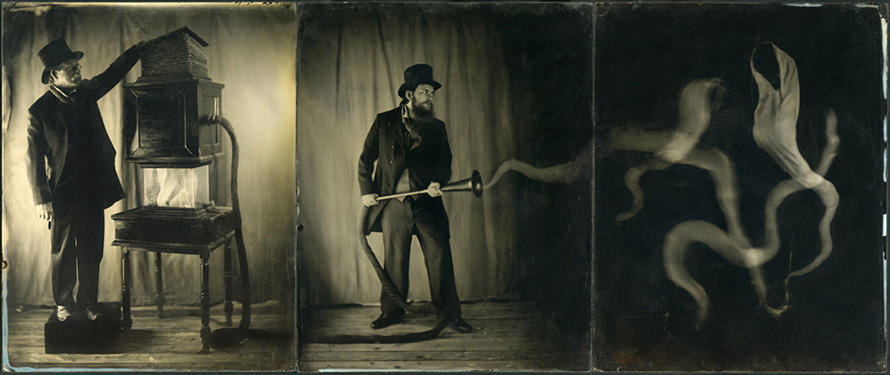


For a few months in 1874, there was a fine American wheeze known as the "Tom Collins." It went something like this: you'd go up to someone in a bar, and ask if they'd heard the scandalous things Tom Collins had just said about them. The fellow, suitably angry, would demand—"Where is this Tom Collins?" Why, you'd answer—he just stepped out the door. Your mark would run outside seeking the malefactor. After a pregnant pause for the door to click shut, the bar would burst out laughing—for Tom Collins did not exist. The ever-elusive Mr. Collins was quickly immortalized in a cocktail name and a blizzard of piano novelty tunes:
I think you've seen me before, And now you see me no more. Oh 'tis the best joke I ever saw. Ha, ha, ha, ha, ha, ha, ha, ha.
Alas, America's precious supply of gullible marks was soon exhausted. But the shortage would not last, for in 1884 Electrical World magazine ran this curious report from New England:
A Grave Joke on Undertakers.—Some malicious wag at Providence, R.I., has been playing a grave practical joke on the undertakers there, by summoning them over the telephone to bring freezers, candlesticks and coffins for persons alleged to be dead. In each case the denouement was highly farcical, and the reputed corpses are now hunting in a lively manner for that telephonist.
They probably had as much luck finding him as they did in locating Tom Collins. But perhaps they should have taken a certain pride in being singled out by this dastardly dialer: for they were, as best as I can tell, the victims of the world's first known prank phone call.
It took a certain daring—and plenty of dimes—to place crank calls in the early days of the telephone. All calls were routed through operators, and the most anonymity one could get was in the pay-phones prominently displayed in drugstores and hotel lobbies. By 1902, though, Electrical World found that phone poltergeists were striking in Providence yet again, this time using While You Were Out message slips to sucker others into making the call:
"Hello, Central."
"Give me 177 Union, please.... Hello, is this 177? Does Mr. Graves want to speak with me? What's that? The North Burial Ground? Oh, ----- ----- -----!"
The gag, it was reported, had actually first originated in New York City, as a ploy "akin to the old Tom Collins joke." Callers had been innocently calling New York Aquarium and asking to speaking to Mr. Fish. One suspects the victims then turned perpetrator themselves, as the Bronx Zoo was promptly overrun with phone calls for a "Mr. Lyon." Soon nobody was safe: keepers at the Lincoln Park Zoo in Chicago were buried by calls for "Mr. B.O. Constrictor," while in Washington the chair of the House Appropriations Committee, returning a call from "Mr. Train," found himself connected to Union Station.
For decades, April Fools Day became a virtual New York holiday for inflicting these dummy calls on younger siblings and new office workers: on April 1st of 1928, the Bellevue Morgue recorded some 125 calls for Mr. Stiff, 73 calls for Mr. Coffin, and—rather more creatively—another 50 calls for Mr. Biers. The Aquarium was assailed by 2,646 April Fool calls in 1936; the Bronx Zoo got hit with 1,980 calls that same day for the likes of L.E. Fant and Mr. Behr.
Eventually the Bronx Zoo simply took to disconnecting its Wellington 3-5000 number every April 1st, forcing jokesters to resort to Mr. Bush at the New York Botanical Garden and Mr. Snow at the Weather Bureau. The situation was much the same around the country, though Chicago's zoo hit upon a more pugnacious response: phone operators set up a gramophone so that callers asking for Mr. Lyon were promptly hit with an ear-splitting roar through their handsets.
If you were a child in those years, you were left to amuse yourself for the other 364 days a year with what linguists call a "solicitational routine"—basically a knock-knock joke in disguise. The classic form was to call a tobacconist and ask if they had Prince Albert in a can (Let him out!), the butcher if he had chicken legs (Then buy long pants!), and the lumberyard if they carried cement (That must be heavy!). Asking if someone's refrigerator was running was a distinctly a post-war phenomenon—probably because before then you couldn't be reasonably sure that they'd have a refrigerator.
Unlike the menace of bomb threats or heavy breathing nuisance calls, the essence of the solicitational routine was the juvenile joy of confounding busy adults. Its purest form might been found by one researcher who discovered children calling the home numbers of their teachers and simply gargling into the phone.
Older children, better able to disguise their voices, graduated to impersonating phone company operators: you'd tap the phone with a pencil, inform a mark that you were testing the line, and lead them progressively into whistling into the phone, then yelling into it, and finally into unscrewing the mouthpiece and blowing into the diaphragm. The piece de resistance, rarely attained, was to then request that the householder "stand in the street and scream like a chicken."
The operator gag turns up in news reports as early as 1904, and variants were still going strong in the 1960s, when children called families with the surname of White and claimed to be Black Panthers making a survey of Whites. A 1972 survey of prank calling found the practice was now virtually universal among schoolchildren: one of the few respondents who hadn't made one, when asked why, admitted that it was only because he hadn't learned how to dial yet.
It couldn't last, of course. With the advent of Caller ID in the early 1990s, the joke was pretty much up for any kid seeking the hilarious anonymity of the handset. No more could they dial the bowling alley to ask if they had 15-pound balls; never again would plaster contractors receive calls to fix a crack in the Mayyas household.
Something else had changed, too: the phones themselves. Made of heavy bakelite, with die cast metal bells that you could hear clear across a house, they once spoke of an adult importance that begged for juvenile mockery. "I am calling long distance," people would snap, as if you were supposed to run for your mother, just because the caller was dialing from two whole counties over. Today phones chirp in the pockets of children, omnipresent and vibrating with unlimited minutes: one might as well mock indoor plumbing or electric lighting.
Still, sometimes an old dropped call gets picked up again. A few years ago Irish newspapers reported the Dublin Zoo was in "meltdown" after receiving over 5,000 calls one fine April day. It seems that cell phone users had received urgent text messages asking them to call 820-5800.
The texts were signed by "G. Raffe"—and, of course, by Mr. Rory Lion.

